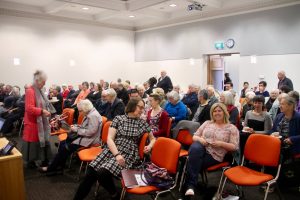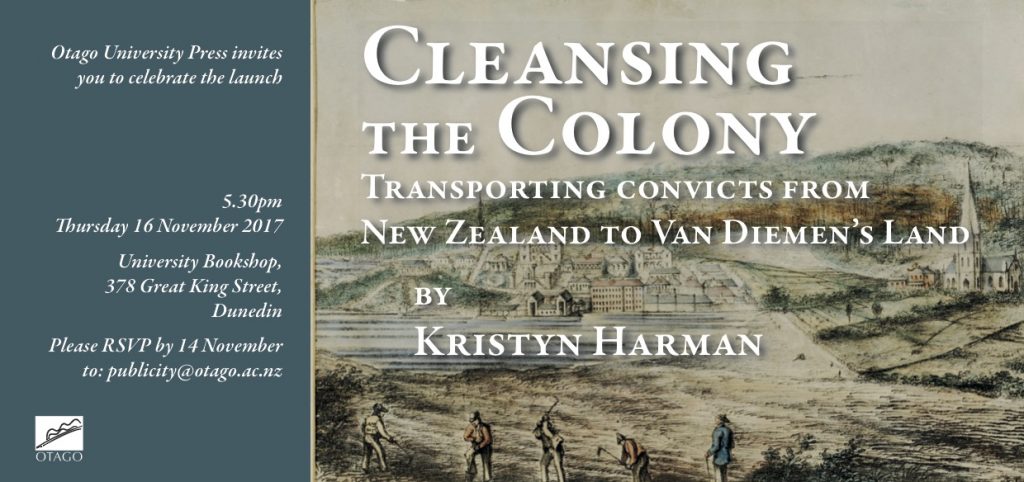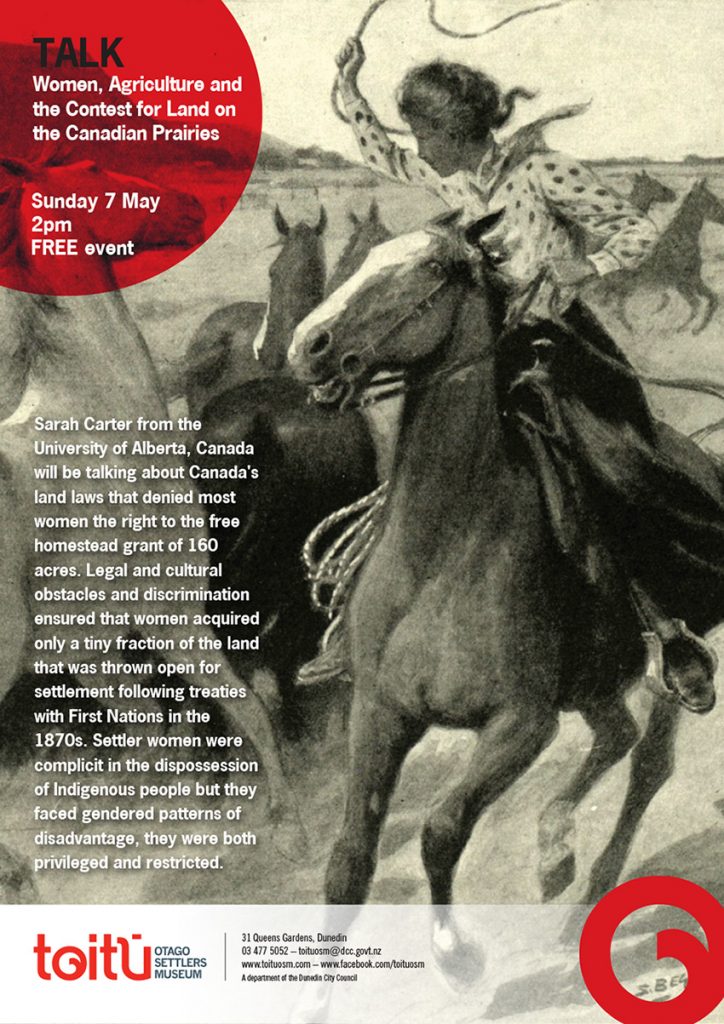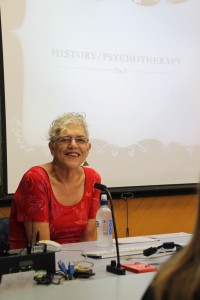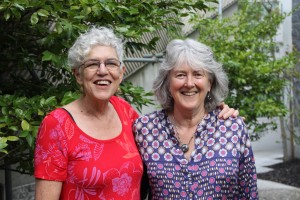Public and Popular History
The Centre was pleased to host Tanya Evans of Macquarie University who gave a public lecture last week. While this was Tanya’s first trip to New Zealand, we also welcomed back a more regular visitor from Australia, Kristyn Harman (University of Tasmania) accompanied by her partner, Nick Brodie.
Academics are encouraged to make their research more “impactful”, which for Humanities scholars is often to get their research out beyond the narrow academic enclaves we work in. Presentations from all of three of the visitors above were relevant to this theme. Tanya, Director of Macquarie’s Research Centre for Applied History, discussed ‘The Emotions of Family History’, looking at why family historians and genealogists undertake their research, and how such research informs wider community understanding of, and individuals’ emotional connection to the past. In her investigations, Tanya interacts with family historians, with her research having far more impact than that of more siloed academic history.
Kristyn was in Dunedin to launch her new book, Cleansing the Colony: Transporting Convicts from New Zealand to Van Diemen’s Land (published by Otago University Press) which examines the more than 100 people sent from New Zealand into the Australian penal institutions. Kristyn also gave a lecture on these convicts to the Tuesday Club at Toitū: Otago Settlers Museum last week. Although most of the Club are retired and from many walks of life, they were keen, attentive, and intellectually engaged, with Kristyn’s talk attracting their largest crowd of the year.
Nick Brodie is an established Australian popular historian, author of Kin, 1787, and The Vandemonian War. Although he has his own academic background in history and archaeology, he now reaches a much larger market through well-researched but accessible books. Nick shared his own publishing experiences in a seminar to both staff and postgraduates at the university, with tips on how to make history relevant and engaging for non-academic audiences.
The Emotions of Family History
This week the Centre is hosting several visiting scholars: Kristyn Harman and Nick Brodie from the University of Tasmania, as well as Tanya Evans from Macquarie University, a noted historian of women, motherhood and the family in Britain and Australia. While in Dunedin, Tanya will give a public lecture on ‘The Emotions of Family History’.
In this lecture Tanya will explore the emotions of family history in Australia, England and Canada – why family historians are motivated to undertake their research and the emotional impact of their discoveries. Using survey data and oral history interviews it will reveal some of the ways in which historical research and communication about the past provides ‘ordinary’ people with social, emotional and cultural capital – how it has transformed them, their lives and the lives of those around them. Family history researchers are sometimes dismissed by the academy for their amateurism and they are also criticised for seeking emotional connections with the past lives of their forebears. I want to suggest that these criticisms are linked. The derision still sometimes shown towards genealogists needs to be challenged and the practice of family history better understood because it has an enormous impact on historical consciousness and individual subjectivities.
All are welcome to attend the talk, which is scheduled for Tuesday 14 November, 5.30pm in Moot Court, 10th floor of the Richardson Building at the University of Otago.
Cleansing the Colony: Lecture and Book Launch
Dr. Kristyn Harman (University of Tasmania), who was a visiting scholar with the Centre in 2014, has returned to Dunedin for the launch of her latest book, Cleansing the Colony: Transporting Convicts from New Zealand to Van Diemen’s Land. She will also give a public talk on her book at Toitū.
Please feel free to come along to one or both of these events. Details are below:
Lecture: ‘Cleansing the Colony’, Tuesday 14 November, 10am at Toitū Otago Settlers Museum Auditorium.
During the mid-nineteenth century at least 110 people were transported from New Zealand to serve time as convict labourers in the penal colony of Van Diemen’s Land (Tasmania). Even more were sentenced by colonial judges to the harsh punishment of transportation, but somehow managed to avoid being sent across the Tasman Sea. In this talk, the remarkable experiences of unremarkable people like William Phelps Pickering, a self-made entrepreneur turned criminal; Margaret Reardon, a potential accomplice to murder and convicted perjurer; and Te Kumete, transported as a rebel will be explored. Their stories, and others like them, reveal a complex colonial society overseen by a governing class intent on cleansing the colony of what was considered to be a burgeoning criminal underclass.
Book Launch: Thursday 16 November, 5.30pm at University Book Shop, 378 Great King Street.
Women, Agriculture and the Contest for Land
On Sunday May 7th, Professor Sarah Carter (University of Alberta) is giving a free public talk on Women, Agriculture and the Contest for Land on the Canadian Prairies at Toitū starting at 2pm. All are welcome!
Feminist Oral History
If you happen to be in Wellington on April 7, do consider attending a public lecture on feminist oral history being presented by Lynn Abrams, one of the leading scholars in the field. Professor of Modern History at the University of Glasgow, Lynn has published widely on oral history, notably her important book, Oral history Theory. In her public lecture she will draw upon oral histories conducted with British women who came of age in the immediate post-war decades to explore the influence and meaning of feminism in life narratives. Click on ‘This isn’t very feminist at all…’ Talking about feminism with post-war British women for details.
Public Lecture on Visualizing Cultural Heritage
The Department of English and Linguistics, the Postcolonial Studies Research Network, and the Centre for Research on Colonial Culture are pleased to host Professor Martina Ghosh-Schellhorn, Saarland University, Saarbrücken, Germany, from 14-18 March, 2016. Professor Ghosh-Schellhorn holds the Inaugural Chair in Transcultural Anglophone Studies at Saarland University. Her wide-ranging research areas include literary and cultural studies, popular culture, intermediality, popular and art-house film, diaspora studies, memory studies, museology, material culture, pedagogy and curriculum development and the canon.
While at Otago, she will give two presentations, to which all are invited.
Open Lecture
Tuesday 15 March, 5.15pm-6.15pm, Archway 2 Lecture Theatre
Hosted by The Postcolonial Studies Research Network and the Centre for Research on Colonial Culture
“Re-Configuring Government Houses: Virtual Models and Life-Worlds in Transcultural Perspective”
This talk concerns a fresh approach to visualizing cultural heritage in a Transcultural Anglophone Studies (TAS) context. In collaboration with Artificial Intelligence experts, we have undertaken research into the material history of Empire so as to re-visit received historiographies with an aim to revising them in the light of contemporary analytical tools. The focus is on British Government Houses in transcultural perspective.
What was it like to live in a British Government House? I would like to use TAS’s xml 3D virtual model of Government House Calcutta (1803-) to demonstrate the advantages of using computer technology to support research into the field of colonial architecture by incorporating into it evidence of the various life-worlds found here. Besides taking a virtual 360o –tour of the building and its grounds, we will also be zooming in to one of its most representative interiors, the Throne Room. Accompanying us on our tour are a selection of the epistolary, autobiographical, as well as pictorial materials left us by the former incumbents of the House, the objects that they chose to be surrounded by, and the current use to which this still-functioning edifice is being put.
Department of English and Linguistics seminar presentation
Friday 18 March, 4.00-m-5.00pm, in Burns 4 Lecture Theatre
“Representing the Beautiful Forevers: Subaltern Lives Straight From the Page to the Stage?”
This talk, freely borrowed as its title is from Katherine Boo’s National Book Award winner, Behind the Beautiful Forevers (2012), seeks to address the problematic field of the so-called ‘Third World’ slum. I will be looking at Boo’s text as a project that sets out to (re-)present, for a ‘global’ readership, the lives of these Others, before moving to a recent example of another ‘global’ project: the much praised Behind the Beautiful Forevers as scripted by David Hare and performed by the National Theatre (Nov. 2014 – April 2015). What, we could ask, are the consequences when Boo’s narrative about Mumbai slum ‘dwellers’ [sic] is adapted for a mainstream British stage? Should we join the critics in their almost unanimous praise of a successful and, moreover, prescient transcultural stage production that claims to be ‘epic theatre’? What exactly are the implications of this packaging for consumption of subaltern life-narratives?
Public Lecture on Reproductive Politics in South Africa
Associate Professor Susanne Klausen (Carleton University), an award-winning historian who has published widely on aspects of reproductive rights in South Africa, is visiting the University of Otago as a Williams Evans Fellow. Her first book was Race, Maternity, and the Politics of Birth Control in South Africa (Houndmills, UK: Palgrave MacMillan, 2004), and her most recent publication is Abortion Under Apartheid: Nationalism, Sexuality, and Women’s Reproductive Rights in South Africa (New York and Oxford: Oxford University Press, 2015).
Associate Professor Klausen will give a public lecture on the topic “From Rights to Justice: The Ongoing Struggle for Women’s Reproductive Freedom in Post-Apartheid South Africa” on 1 March (Tuesday). Her talk begins at 5.30 in Archway 2 Lecture Theatre and is open to the public. All are welcome!
Hocken Lecture
Tony Ballantyne, the incoming PVC Humanities at the University of Otago, departing HoD of History and Art History, and Director of the Centre for Research on Colonial Culture gave the 2015 Hocken Lecture last week. In it, Tony discussed some archive stories that are foundational to his own work, and critiqued claims about archival silences promoted by some postcolonial scholars by pointing to the lively and rich vein of work being produced at the University of Otago, particularly by researchers attached to the Centre. You can read about his lecture in this Otago Bulletin article, which gives a thorough report on its content and maps out Tony’s vision for New Zealand history. Thanks Tony for a wonderful lecture!
Lecture on the August Offensive
The next Global Dunedin lecture will take place this Sunday, August 9th, in the Toitu Auditorium, beginning at 2pm. It is being delivered by Seán Brosnahan, a well-known local historian and curator, who will discuss the fighting at Gallipoli that came to a thundering crescendo in the August Offensive. Its failure, despite the heroic roles played by the Otago Infantry and the Otago Mounted Rifles, was the death knell of the Dardanelles campaign. Come along to hear an excellent public speaker mark the 100th anniversary of that ill-fated offensive.

